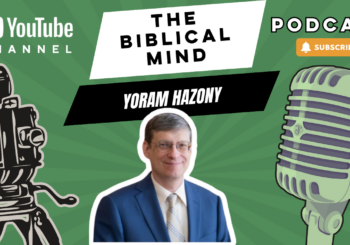Neither Work nor Leisure Provides ‘Our Daily Bread’
When I was in the military, my commander would often stir us up before difficult missions by citing our squadron’s informal motto: “Work hard, play hard!” I eventually figured out that this meant we were expected to have an exceptional work ethic, and we did. However, we worked hard to enjoy the pleasures of drinking and rowdiness in lands foreign and domestic. I call this “the leisurist’s lie”: Work is the opposite of pleasure, and hard work aims at gaining more time to play. As the life of ancient Israel reveals, the truth is that God designed both work and rest to be meaningful and to strengthen our trust in Him.
Many ancient Near Eastern folks thought work was a punishment from the gods. But in the Bible’s creation story, work is good. In Eden, God and man both work to cultivate a garden before anything goes awry. God ultimately curses work and its produce, changing the relationship between humanity and the verdant earth to one of toil. Work is still good, but corrupted.
Enjoying this article? Read more from The Biblical Mind.
‘Work’ in Ancient Israel
What the biblical authors meant by “work” and how we think of work today probably differs significantly. For most of history, work has been physical and most free time had to be used for physical rest. We have little archeological evidence of the pursuit of leisure among ancient Israelites. The physical structure of an ancient Israelite house was almost entirely dedicated to producing the basic subsistence products of daily life. By contrast, the average American home is almost entirely dedicated to different types of leisure. Even those so-called workspaces in our homes, such as the kitchen and garage, are largely used for our pleasures. Try to imagine what our ancient predecessors would think of the vast cornucopia of foods we prepare in our modern in-home kitchens, just for the sake of variety and without arduous labor. For much of the Western world, the toilsome nature of work has been reduced in both time and effort. What can we learn from the past, despite its stark difference from our own experience?
In the first place, we can observe that work is unmistakably central to life. For Israelites, there was little time for leisure and no space in the house dedicated to it. Work fully belonged to the spaces and rhythms of the household, which typically supported twelve to eighteen family members. The Bible is largely silent on leisure activities in ancient Israel.
The biblical storyline repeatedly teaches that God’s provision requires human cooperation. The wheat, which God watered and caused to grow, still has to be harvested. Consider Jesus’ phrase from His prayer, “our daily bread,” and the amount of work that went into producing bread for each day at that time. The goal of bread-making was to produce enough consumable calories to sustain the body for the coming days, weeks, and years. Every grain of wheat represented a massive effort sustained by the whole family to harvest, stack, beat, thresh, and store the grain. There was no Tupperware, no aluminum foil in those days. Mold, rot, rodents, and insects could incite malnutrition as easily as could lack of rain.
Setting aside the labor involved in harvesting and storing grain, scholars estimate that four to six hours a day were dedicated to grinding grain between stones in order to produce flour to make bread. Grinding flour was so enmeshed in the daily labors of ancient Near Eastern cultures that figurines bowing at the grinding stone are found in every society from Egypt to Mesopotamia. After the grain was pulverized, it took another hour to make the dough, build the fire, and eventually bake the bread. The symbolic power of daily bread is so ingrained in Israelite culture that it can be used to describe the necessity of Jesus Himself: “I am the bread of life” (John 6:35).
Considering all the work that went into these meager amounts of daily bread gives us a better perspective about what might appear to us as “light sentencing” in Genesis 3. The curse of the man in Eden still scourged the all Israelites who read or heard this text: “By the sweat of your brow, you shall eat bread” (Gen. 3:19).
The Value of Work and Rest
When Jesus includes the provision of daily bread in His model of prayer, He teaches us to ask for both food and the work it takes to produce it. The leisurist’s lie is that we work to gain more free time. But Scripture teaches that work is good, even if toilsome. Work connects us to creation. It grounds our airy ideologies. It forges community. It exhausts us and sweetens our rest. Work fosters innovation. It produces the food that provides calories to keep us from starving. Even though the nature of work has shifted away from manual labor and subsistence farming, our work still produces things and God still requires us to trust Him to provide our daily bread.
If we work only to produce disposable income and hours of leisure each day, how can God use our work to teach us about His kingdom? Proverbs relies upon our direct contact with earnest work in order to become wise and understand its teachings. Work is considered the prerequisite to understanding (Prov. 24:12). Wisdom regards sluggishness and sloth as fatal, and both ironically end in forced labor (Prov. 12:24; 21:25). Even Jesus’ parables often rely on an agrarian knowledge of work.
Honestly, I’m not sure what the biblical authors would have thought about office jobs like mine. I imagine they would be perplexed by my insistence that professoring is “work.” Like me, they would have to think about how God regulates a profession that wouldn’t look much like work to them.
If anything, the ancient Israelites faced temptation to work too much, compounded by the particular geography of their land. Unlike the Nile-fed land of Egypt or the empires seated between the dependably strong waters of the Euphrates and Tigris rivers, ancient Israelites were particularly susceptible to drought and famine because few sources of regulated water flowed through Canaan (modern day Israel/Palestinian Territories). Israelites depended almost entirely upon the seasonal rains. That reliance on rain to feed the soil explains Israel’s temptations to worship the fertility god Ba’al, the charioteer god who was depicted riding the rain clouds that watered their crops to life.
Because starvation, malnutrition, and death persistently loomed over Israel, the temptation to work the soil and tend the flocks seven days a week looms in the background of most Biblical storylines. Indeed, people in agrarian subsistence societies today, such as Kenya, Romania, and Peru, still work every day of the week. But Israel’s God brought His people into this precarious land, commanded them to shun the local fertility gods like Ba’al, and promised to make the land fruitful enough to survive year in and year out (i.e., a land flowing with milk and honey).
Then came the most radical part of all. God demanded that an entire day—every week!—be set aside and unworked. Sabbath, also called “Shabbat,” required a farmer subsisting entirely off of a fragile land and seasonal rains to trust the God of Israel. He had to trust God enough to allow his flocks and fields to lie untended for an entire day each week. As if that were not risky enough, God commands Israel to leave her fields fallow for one entire year out of a seven-year cycle (Lev. 25). What rational person would ever do such things? Without viable reasons, reasonable folks would not. Fortunately, God did not demand blind trust of Israel, but rather, He gave them actual reasons to trust that He—not Ba’al—would provide for them.
The plan of God from the beginning involves humans working six days a week to co-produce with creation. We who sit in the county seat of opulence must ensure that our work demands rest and produces sustenance. If we are working ten hours a day or less, we have considerable leisure time. Some of us devote much of that time to raising children. My family devotes some leisure to hosting students from the college. We also join with our church to spend time with children in Newark, New Jersey once a week. Some folks volunteer to help out in their communities. Some are taking care of aging parents. There is much work outside our jobs that can fulfill God’s mandate to work.
The life of ancient Israel also teaches us the importance of legitimate rest. God’s plan entails rest one day per week. As Americans, we often view ourselves as captains of our own destinies. Sabbath rest requires trusting God to take care of us despite leaving our lives unworked one day a week. As Jesus cryptically announced, “The Sabbath was made for man, not man for the Sabbath” (Mark 2:27). It’s for us, neither a punishment nor merely leisure time, but to teach us to trust God.
Learning to Trust God for Our Daily Bread
Trust was the great lesson of the Israelites’ forty years of wandering. When manna rained from the heavens every day in the wilderness, God did not just provide food. He relieved the Israelites from work while they wandered, nomad-like, without fields to cultivate. In exchange, He gave them the harder work of trusting Him to guide them and their daily movements. By the time Israel crossed over the Jordan with Joshua, Israel was formed and shaped by His instruction to bear witness in the land of promise to the radical claim that Yahweh was the only God; and the daily bread from heaven gave way to the fruit of the land they were now obliged to cultivate.
This lesson of trusting God is for all people in all times and places. Although my children will not go without meals because the crops failed, they do have to learn to trust God’s wisdom to direct their lives. Can we orchestrate our lives of work and Sabbath observance so that we begin to see God’s provision and His plans through that one un-worked day?
Our work cannot ultimately be aimed at producing extravagances of “free time” devoted to our pleasures. From Genesis 2 to Psalm 1 to Proverbs 31 to the primary illustrations of the Gospel (sowing, harvesting, watering, etc.), work contains its own reward.
We work to provide for our necessities and to bring out the capabilities God wove into creation and society; we rest to remember that God is the One who ultimately provides for our needs, orders the world, and orchestrates its movements. What play is is a topic for another time; what play is not is an antidote to work or an independent source of meaning and joy. Meaning and joy are found only in right relation to God and His creation—a relation that is realized only in deliberate, trusting rest from our work, and work that yields the true pleasures of honest tiredness and fruitful increase—both in and beyond our jobs.
In a world where even our working lives look more like the lives of ancient royalty, we must pursue proper pleasures in our work and wisdom in our leisure. If our work allows our ideas to detach from reality, from creation, from toil that enjoys rest, from trusting God to provide, then we must question the kind of work to which we commit ourselves. If our work presses us to forego Sabbath rest and retreat, if it creates divisive communities, or if it replaces the community of the church, then we must ask of it, “To what end am I working?” And if our rest is not an act of trust in God and relief from work, we are not really resting—or rejoicing—at all.
This article was originally published in Emblem on May 10, 2017.
Subscribe now to receive periodic updates from the CHT.





